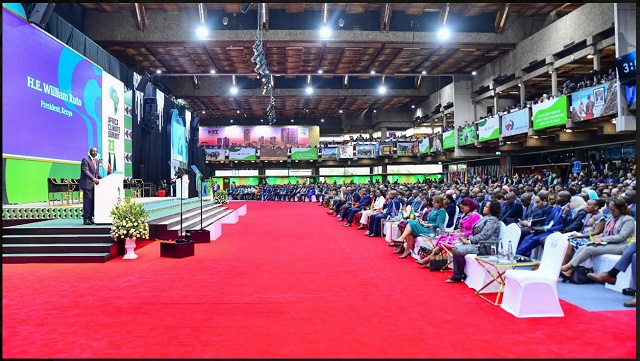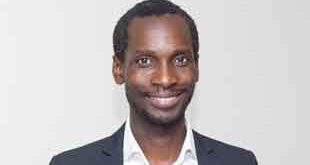
Over US$23bn committed to Africa but not everyone is happy
Kampala, Uganda | RONALD MUSOKE | While opening the inaugural Africa Climate Summit at the Kenyatta International Conference Centre in Nairobi on Sept.4, President William Ruto referred to it as “no ordinary summit.”
Ruto said the organisers of the conference, Kenya and the African Union, had called for it ahead of COP28 scheduled for November in the United Arab Emirates, “not to catalogue grievances and list problems” but to “imagine, design and then build a future of prosperity for Africa and the world.”
“We are not here just to talk about Africa or climate change in the usual way, which often accentuates our divisions…north versus south, developed versus developing, polluters versus the victims,” Ruto said in opening remarks to about 20,000 attentive guests.
“Let me be clear, these conversations are necessary,” he said but added: “We are here to scrutinize ideas, assess perspectives, and unlock solutions.
“We will not shy away from the difficult conversations and uncomfortable realities that must be faced to achieve meaningful change. Policy, regulation, taxation, trade, and climate justice will all be scrutinized, in national, regional and global contexts. I invite all to adopt an “opportunity lens” as we navigate these complex dialogues.
“This context is precisely what sets this Climate Summit apart from others. It aims to unite us—across neighbourhoods, across sectors and institutions, across country borders, across continents and across generations,” Ruto said.
He reminded the delegates about Africa’s miniscule carbon footprint and how the toll of climate change is disproportionately high on the continent. According to the State of Climate in Africa Report 2022, the rate of temperature increase in Africa has accelerated in recent decades, with weather- and climate-related hazards becoming more severe. Just last year, more than 110 million people on the continent were directly affected by weather, climate and water-related hazards, causing more than US$ 8.5 billion in economic damages and 5,000 deaths.
Ruto said the urgency to address loss and damage, and to configure appropriate financial mechanisms for resilience grows with each extreme weather event and each bout of climate-induced insecurity. He noted that the daily challenge of the complex interplay of needs and responsibilities is a daily challenge.
Africa’s immense natural resource wealth
He said Africa is not a poor continent and listed some of its assets; immense resources in renewables, restorative agriculture, green industrial transformation, and natural carbon sinks. He said Africa’s carbon sinks alone were a gold mine whose value needs to be reflected in the continent’s balance sheets as part of its GDP.
“Kenya for instance has 92% of its power being renewable, and is well on its way to achieving 100% renewable by 2030 and a 100 Giga Watt grid, entirely renewable, by 2040,” he said.
Ruto also underscored the massive potential of Africa’s green minerals to decarbonize the global economy while providing economic transformation in Africa through not only mining but also bringing value-added processing and manufacturing to the continent, turning an US$11 billion asset into a U.S. $7 trillion market opportunity.
In order to unlock this future, Ruto said the global financial system needs to be fair and equitable, reduce Africa’s debt burden and the high cost of capital paid by African countries in comparison to developed countries, and unlock investment flows and bring down trade barriers.
Deals galore in Nairobi
Held under the theme, “Driving Green Growth and Climate Finance Solutions for Africa and the World,” the three-day conference saw deals worth billions of dollars unveiled by several governments, the private sector, multilateral financial institutions and philanthropists. At least US$23bn was committed for green growth, mitigation and adaptation efforts in Africa.
The United Arab Emirates’ COP 28 President Sultan Al Jaber announced a US$4.5 billion initiative to produce 15GW of clean energy in Africa by 2030. “What was promised in Sharm el Sheikh must be delivered in Dubai; pledges have got to be backed by actions,” he said and mentioned a proposed “Loss and Damage Fund.” He also had a warning for the international financial institutions (IFIs) and multilateral development banks (MDBs).
“We must admit that we’re not delivering the results we need in the time we need to and finances are needed,” Al Jaber said. He also said developed countries need to meet their climate finance commitments and double adaptation finance by 2025. He said needs to be operationalised at COP28.
The EU Commission President, Von der Leyen, announced a €150bn commitment to Africa through its Global Gateway programme, some of which has already been allocated to improve energy access in the Democratic Republic of Congo (DRC) and Burundi.
She offered Europe to support Africa at COP28 and said a win-win partnership between Africa and Europe in Dubai could be achieved through a joint push for a Global Green Bonds Initiative, carbon pricing and carbon credits, and setting global targets for energy.
Adaptation
There was also the announcement of a US$190 million facility to promote sustainable agriculture in 11 countries across the world by the Green Climate Fund. The facility will help promote sustainable agriculture devoid of deforestation in the DR Congo, Zambia, Gabon, Cameroon and Cote D’Ivoire. The United Kingdom also announced that it will provide US$62 million for adaptation projects in Africa.
But it was emphasized that more resources for adaptation are needed for the continent to cope with the ever-devastating impacts of climate change. According to new research from the Global Centre on Adaptation released on Sept. 5, climate adaptation finance flows to Africa must increase 10-fold to over US$100 billion per year by 2035 to build resilience against the growing impacts of climate change.
Without such investment, it is estimated that the continent could lose out on as much as US$6 trillion of economic benefits by 2035 as every US$1 invested in adaptation has been shown to generate a return of between US$2 and US$10.
Nairobi Declaration call to action
On Day Three of the conference, the African leaders came up with what they referred to as the Nairobi Declaration on Climate Change. It recognised climate change to be the “single greatest challenge facing humanity and the single biggest threat to all life on Earth” and urgent, concerted action from all nations to lower emissions and reduce the concentration of greenhouse gases in the atmosphere.
They noted that despite Africa having an estimated 40% of the world’s renewable energy resources, only US$60 billion or 2% of US$3trillion renewable energy investments in the last decade have come to Africa.
Meeting the 300 Giga Watts (GW) target by 2030 at an estimated cost of US$600 billion, could translate to a tenfold increase in the finance capital flowing into Africa’s renewable energy sector over the next seven years, they said.
According to the Nairobi Declaration, unlocking Africa’s climate positive growth potential on a scale that can contribute meaningfully to decarbonisation of the global economy will require several multiples of the current development and investment finance flows.
The leaders noted Africa’s role as one of the largest carbon sinks through the Congo Forest and peatlands, the potential in Africa’s savanna grasslands, mangroves, swamps, coral reefs and marine reserves, and the progress made by African countries in promoting land and ecosystem restoration through various initiatives and programmes.
In its call to action, the Summit urged world leaders to rally behind the proposal for a global carbon taxation regime; including a carbon tax on fossil fuel trade, maritime transport and the airline industry.
The Summit also agreed to back this proposal with a global Financial Transaction Tax (FTT) to provide dedicated affordable and accessible finance for climate positive investments at scale and ring-fencing of these resources and decision making from geopolitical and national interests.
“Africa has spoken, we have articulated clearly the way forward for our continent and the world. Our needs, priorities and commitments are clear, and so too are the tasks and responsibilities of the global community,” Ruto posted on his Facebook page in reference to the Nairobi Declaration that was approved at the end of the summit.
“This declaration marks a pivotal moment in our collective efforts, with an urgent call to the international community to prioritize humanity’s economic and ecological needs for our sustainable growth,” Ruto said.
Yet, not everyone left Nairobi satisfied.
During the Summit, just outside the Kenyatta International Conference Centre, several civil society groups, Indigenous communities and other non-state actors marched and picketed. They also issued their own “People’s Declaration,” in which they demanded that African countries reframe and implement alternative models of development that move them away from colonial and northern models of economic growth.
The group said that the Africa summit is an opportunity for the continent to chart its own vision and leadership for sustainable development and that this chance could be squandered by the agenda being unduly influenced by external western interests.
Some African climate experts showed concern about the continued push for carbon markets in Africa, labelling these as “pollution permits.”
“The very design of these markets is for us to proffer pollution permits to wealthy industrialized countries and companies, locking them into a high emissions pathway and shifting the burden to African people. It’s actually a new form of colonialism,” said Mohamed Adow, the Director of Power Shift Africa; a think tank. His view on carbon markets was backed by a report released on Sept.4 by Power Shift Africa and partners.
“For rich polluters, this is a silver bullet and a painkiller that allows them to keep pumping greenhouse gases into the atmosphere. But for Africa, they are a placebo drug that ends up making the pain of climate change far worse,” Adow said.
Given the opportunity cost of preserving peatlands, speakers at the Investment in Nature and Biodiversity session called for an open regulated market for nature markets terming them as the most unfair markets in the world. They called for countries like the DR Congo to be compensated for preserving the Congo Forest.
Less talk, more action
“We welcome plans by African leaders to utilize the continent’s renewable energy potential, boost renewable deployment as it would not only go a long way in addressing the continent’s pressing energy needs and the climate crisis but also stimulate economic development,” said Patricia Bekoe, a Ghanaian climate activist based at Ghana Reducing Our Carbon.
“Our leaders need to know that people across Africa are waking up to what needs to be done. We are calling for less talk and more action. We need to break away from the failed approaches and distracting false solutions,” said Essoklnam Pedessi, a Togolese climate activist based at the Renewable Energy Coalition in Togo.
“Africa has abundant wind and solar to power up for 100% renewable energy. What it needs is climate funding to unlock this potential. We are calling for the end of all fossil fuel projects and investment in renewable energy sources.”
Zaki Mamdoo, the Campaign Coordinator at #StopEACOP, was unhappy that the declaration did not order a halt on the development of new fossil fuels on the continent. He said the Summit provided a platform for governments to flirt with big business while CSOs, CBOs, trade unions, youth organisations were confined to the fringes with little influence on the outcome of high-level deliberations.
“The solutions do not lie with private capital and the age-old profit driven model. The entire system needs to be overhauled if we are truly going to transcend our interlocking crises,” he said.
 The Independent Uganda: You get the Truth we Pay the Price
The Independent Uganda: You get the Truth we Pay the Price


